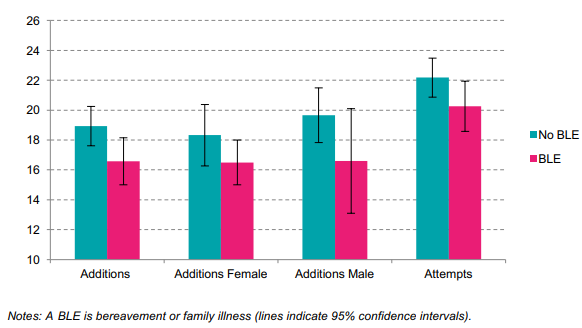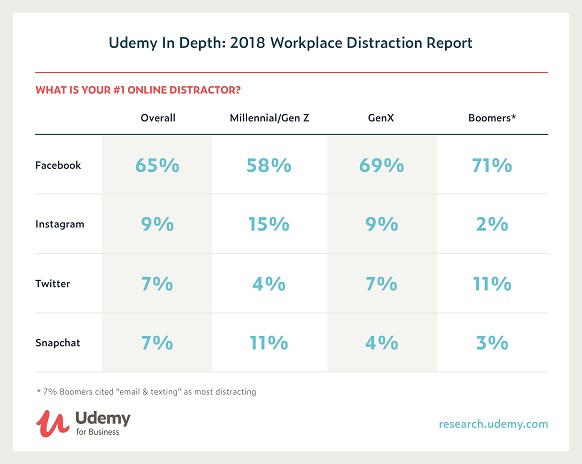At the core of any successful company is productivity. If your employees are productive, more revenues can be generated. If productivity is poor, you’ll hemorrhage money. If not dealt with, this will lead to your company closing its door.
And in order to improve productivity, employees have to be happy and healthy.
There is evidence for this. The University of Warwick’s Centre for Competitive Advantage in the Global Economy found that employees struggling with negative life events, like illness or a death in the family, had lower productivity. (“BLE” stands for “Bad Life Events.”)
Employee happiness is one element of productivity, but what happens outside of work is outside of your control. Your best bet is to focus on your company’s culture and processes. Maybe your processes are too complicated, or your employees don’t have the tools they need to do their jobs well.
With that in mind, let’s take a look at seven ways you can increase productivity.
1. Delegate
Delegation is arguably the most important skill a manager can have. Apart from efficiency, employees experience higher morale and job satisfaction when tasks are delegated effectively. This is because they feel a sense of achievement and investment in the company and the work.
But don’t just delegate the tasks to whoever happens to be closest! Consider experience, independence, track record, and current workload when deciding who to delegate a task to.
When you delegate, make sure you specify the desired outcome. The end result should be your primary concern, much more so than how it’s achieved. You can establish controls and provide support, but don’t be too focused on the process. Just keep up with what your employees are working on and make yourself available when they need you.
And when the work is done, give credit and praise where it is due.
2. Improve Conditions in the Workplace
Poor working conditions lead to reduced morale and productivity. In extreme cases, they can even lead to accidents and injuries. For instance, an employee is less likely to be efficient if they are uncomfortable because the workplace is substantially too hot or too cold.
But it’s not only the physical conditions of the workplace that have an effect on employees’ productivity. You should also pay attention to these factors:
- Pay – Make sure your pay for each position is competitive in order to avoid high staff turnover. You must also provide pay parity. Paying some employees more than others for the same job will not only harm morale, but it can be illegal if the disparity is based on factors like gender or age.
- Benefits package – Ensure a competitive benefits package as well. This might include comprehensive health insurance, paid vacation, and generous sick leave. This gives your staff a better work-life balance, meaning that they will get more done when they’re in the office.
- Recognition – Give credit where it is due. Never practice favoritism. Instead, ensure that your company is a meritocracy so that employees have an incentive to do their best work.
Poor working conditions encourage staff to seek out new opportunities. Considering the high cost of hiring and training new employees, it’s better to get things right the first time.
3. Reduce Distractions
According to the World Economic Forum, the modern workplace has become so distracting it is costing businesses time and money. Some of the worst offenders? Interruptions from co-workers and pointless meetings. Then there’s smartphones and social media. In 2018, Udemy came up with a study that showed that social media was the primary distraction in the workplace.
In the study, Udemy asked employees which mobile platforms distracted them the most.
Source: Udemy
Based on these findings, the logical thing to do would be to prohibit employees from using their phones during work hours. But this treats your employees like children who cannot be trusted. It will lead to unhappiness in the workplace and it won’t actually stop the behavior – employees will just make more effort to be covert about it.
When asked what their employers could do to reduce distractions in the workplace, 40% answered that they would like flexible schedules and remote work options. 38% said employers should designate quiet spaces for work, while 37% said management should provide training on time management.
This last point is particularly important. The key to mitigating the impact of distractions lies in giving your employees the skills to stay focused by themselves.
Other ideas to keep in mind: 31% of respondents also said employers should define cultural norms around noise levels, while 23% said they would appreciate regular “no meetings” days.
4. Have the Right Tools
If your employees don’t have the right tools, you can’t expect them to be productive.
Gallup researchers at a fiberglass facility in Brazil asked employees to rank the most critical elements which determine productivity. They overwhelmingly chose to have the equipment and materials they need.
If you need a weekly report on sales, for example, you have to make sure your employee’s computer and printer work properly. Otherwise, they might spend hours trying to fix these problems, or else using valuable tech support time.
Similarly, if you want your employee to follow up on reports from other branches in a timely fashion, make sure they have access to a working phone.
Ultimately, having the right tools at work and ensuring that they’re in working order saves you money. This way, you have productive employees who can focus on their tasks rather than on struggling to fix their tools.
5. Give Credit Where It is Warranted
To encourage productivity, businesses need to reward employees who excel. The psychological principle behind this is simple. If you reward a behavior, it is more likely to be repeated. This is just as true for professional adults as it is for children!
B.F. Skinner, the American psychologist behind this principle, calls it operant conditioning. It works by strengthening operants, or our decisions to take certain actions, thus making it more likely that the person will take the same action in the future.
These rewards can come in different forms. For example, a salesperson receives a bonus for hitting their targets. Extra holidays might be offered to executives for securing a critical deal. Even small rewards like bringing in donuts or taking your team out for lunch when they successfully complete a big project can mean a lot.
In the long term, pay raises and opportunities for promotion should be offered to staff with excellent track records.
But if an employee is rewarded for good behavior, should they also be “punished” for bad behavior? Gene Milbourn Jr., a professor at the Robert G. Merrick School of Business at the University of Baltimore, does not think so.
In his article published in the Wichita Business Journal, Milbourn said punishment in the workplace can lead to the following undesirable results:
- More use of punishment – When an employee is punished by a supervisor, the bad behavior stops. The supervisor sees this as a good thing, which means he or she can be encouraged to use punishment again in the future. This doesn’t leave anyone feeling happy!
- Good behavior only when the supervisor is present – Since the supervisor is the primary source of the punishment, employees will tend to behave well only when they’re around.
- More bad behavior – People respond differently to punishment. Often, feelings of resentment can occur.
- Fear, psychological tension, and anxiety – These can interfere with a worker’s productivity in the workplace or might even cause them to change jobs.
Milbourn’s conclusion is this – The impact of reward is simple. The effect of punishment, however, is complex and unpredictable. As such, it is best avoided by managers if they want to improve productivity. It is better to create a culture of empowered, productive staff who feel valued at work.
6. Set SMART Goals
For employees to be productive, they should be guided by a set of goals. But these goals must be meaningful and properly assessed in order to have the desired impact.
Business schools tend to teach the SMART method, which states that goals must be:
- Specific
- Measurable
- Assignable
- Relevant
- Timely
So how important is it for business goals to be SMART? Consider these statistics from Norton and Kaplan, as reported by Fast Company:
- 9 of 10 companies fail to meet their long term goals,
- Only 5 percent of employees sufficiently understand these goals.
Businesses with SMART goals can effectively provide direction, as it makes it easier for employees at all levels to understand the business’s goals. They can also facilitate planning and help evaluate performance.
7. Be Efficient
Sometimes the workflow is the problem. To address this, come up with a list of tasks that the company needs to prioritize. You can also encourage team members to come up with their own list of tasks and priorities. This makes sure that time and energy is focused in the right place.
Many workers waste vast amounts of time scanning and responding to emails. An easy way to maximize efficiency is to encourage your staff to use email productivity tools. There are plenty of simple email tricks you can implement to improve your efficiency.
Keep track of your employees’ time, if necessary, by using a time clock app. Better yet, encourage them to use these tools to self-manage, so that they don’t lose motivation through feeling continuously “watched”.
Working Together to Improve Productivity
In this article, we’ve seen the importance of productivity in the workplace. Ensuring productivity is everyone’s job, from the Owner and CEO to every single member of staff.
In light of this, we saw 7 concrete steps you can take to improve productivity. Your business processes must be efficient. You must also delegate tasks, improve conditions in the workplace, reduce distractions, and make sure that your team has the tools and equipment they need.
You should also create a meritocratic system by giving credit and reward to hardworking staff, and develop SMART goals which empower your business and all your staff to reach their true potential.
Now it’s over to you. Follow these tips, and in no time your company’s productivity will soar.
Image by Gerd Altmann from Pixabay








Leave A Comment